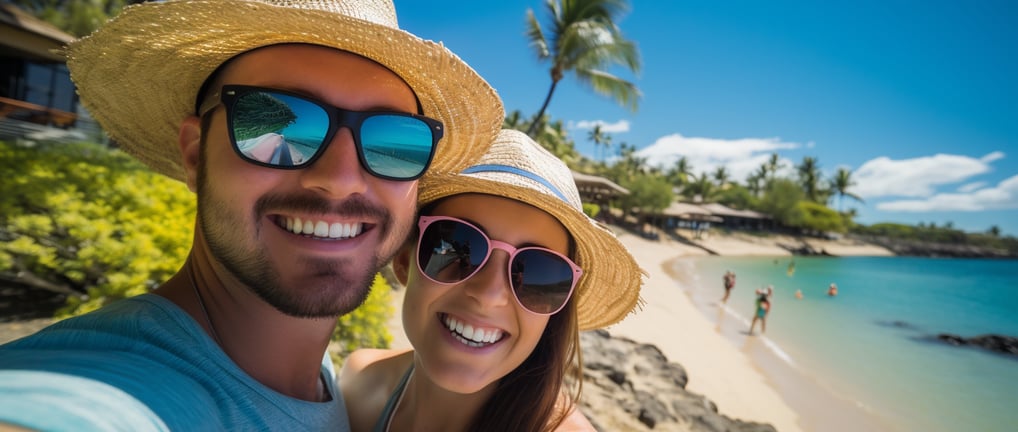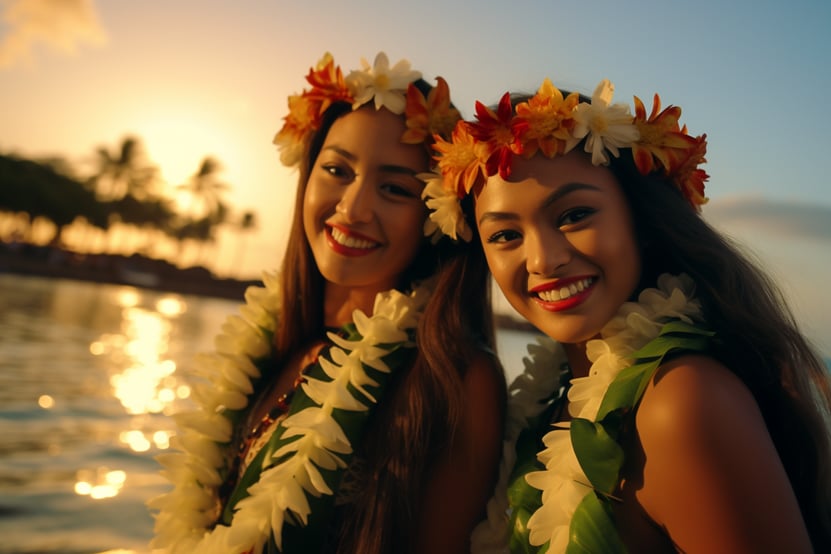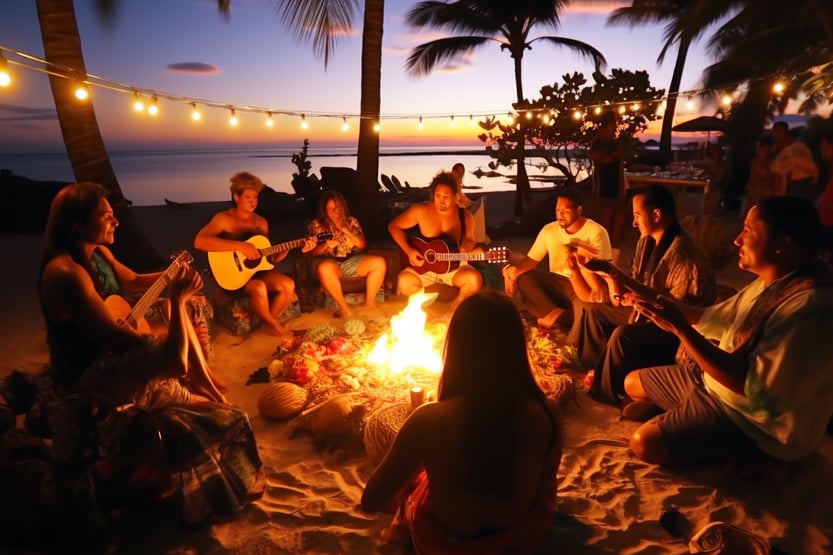Lost in Time: The Timeless Traditions of the Hawaiian Islands
Have you ever dreamed of escaping to a place where time seems to stand still? A place where ancient traditions and cultural practices have persevered through the centuries, immersing you in a rich tapestry of history and spirituality. Look no further than the enchanting Hawaiian Islands, where the echoes of the past intertwine seamlessly with the vibrant heartbeat of the present. Let's embark on a journey to discover the deep-rooted traditions that have made these enchanting islands a timeless treasure.

Step back in time and explore the ancient cultural practices that have shaped the Hawaiian Islands into what they are today. For centuries, the people of Hawaii have revered their history and traditions, passing down their knowledge from generation to generation.
From the intricacies of their language to the mesmerizing art forms like hula, Hawaii's traditions reflect the deep connection between its people and the land they call home.
The Significance of Ancient Hawaiian Culture
Ancient Hawaiian culture is a testament to the profound respect and reverence the Hawaiians have for their ancestors and the world around them. At the heart of their beliefs is the concept of "mana," the spiritual energy that flows through all living things. It is this deep connection to the spiritual realm that infuses every aspect of Hawaiian life, from their customs and celebrations to their daily interactions.
The Hawaiians have a rich and vibrant history, with their traditions dating back thousands of years. Their culture is deeply rooted in the land, as they believe that the islands themselves are sacred. This belief is evident in their local traditional houses, but most especially their rituals and ceremonies, which often involve offerings to the gods and goddesses of the land and sea.
One of the most iconic symbols of Hawaiian culture is the hula dance. This ancient art form tells stories through graceful movements and gestures, accompanied by traditional chants and music. The hula is not just a form of entertainment, but a way for the Hawaiians to connect with their ancestors and express their love for the land.
The Influence of Polynesian Ancestors
To truly understand the traditions of the Hawaiian Islands, we must acknowledge the profound influence of their Polynesian ancestors. Originally migrating from the Marquesas Islands, the early settlers brought their customs and beliefs, which were then fused with the unique environment of Hawaii.
These Polynesian ancestors were skilled navigators, using the stars, currents, and the flight patterns of birds to navigate the vast Pacific Ocean. Their voyages to Hawaii were not just physical journeys, but also spiritual ones, as they sought new lands and opportunities for their people.
Through the oral tradition of storytelling, the Hawaiians have preserved the wisdom and knowledge of their ancestors, ensuring their traditions endure through the passage of time. These stories are passed down from generation to generation, serving as a reminder of the rich heritage and deep connection the Hawaiians have with their past.
Today, the traditions of ancient Hawaii continue to thrive. From the annual celebration of the Merrie Monarch Festival, where hula dancers from all over the world gather to showcase their skills, to the preservation of sacred sites and the revitalization of traditional crafts, the people of Hawaii are dedicated to honoring their ancestors and keeping their culture alive.
So, as you explore the Hawaiian Islands, take the time to immerse yourself in the rich tapestry of their traditions. From the chants and rituals to the vibrant colors and intricate designs, every aspect of Hawaiian culture tells a story, a story that has been passed down through generations and continues to shape the identity of the Hawaiian people today.
The Role of Traditions in Modern Hawaiian Life
While the Hawaiian Islands have undoubtedly embraced modernity, the spirit of tradition remains alive and vibrant even in the locals' homes or accommodation properties. Hawaiian cultural practices continue to play a significant role in shaping the lives of the locals, providing a sense of identity and unity within the community.

Preserving the Past: Hawaiian Cultural Practices Today
In this fast-paced world, where new trends come and go, the Hawaiians have made a conscious effort to preserve their cultural practices. From hula workshops to traditional craft courses, the locals are dedicated to passing down their customs to future generations.
Visitors to the islands can immerse themselves in an array of cultural activities, such as lei-making, ukulele lessons, or even participating in a traditional Hawaiian feast. These experiences offer a glimpse into the rich heritage that continues to shape the Hawaiian way of life.
The Impact of Tourism on Hawaiian Traditions
As Hawaii's popularity as a tourist destination has grown, so too have the challenges of maintaining the delicate balance between tradition and commerce. Tourism has undoubtedly played a significant role in the economy and cultural exchange of the islands.
However, the influx of visitors has also brought the risk of diluting Hawaiian traditions and exploiting cultural practices for commercial gain. Responsible travelers are encouraged to seek experiences that respect and support authentic Hawaiian culture to ensure its longevity for future generations.
The Spiritual Connection: Hawaiian Beliefs and Rituals
Central to Hawaiian culture is a deep spiritual connection with the natural world, infused with beliefs and rituals that celebrate the interconnectedness of all beings. From ancient gods and goddesses to the awe-inspiring power of nature, the Hawaiians find beauty and meaning in their surroundings.
The Importance of Nature in Hawaiian Spirituality
For the Hawaiians, nature is not only a source of sustenance but also a wellspring of spiritual nourishment. From the sacred mountains to the tranquil beaches, every element of the environment is revered and honored.
For travelers seeking a deeper connection with nature, exploring destinations like the lush valleys of Kauai or the volcanic landscapes of the Big Island offer a profound experience that heightens the senses and cultivates a sense of peace and harmony.
The Role of Ancestors in Hawaiian Beliefs
The Hawaiians believe that the spirits of their ancestors continue to guide and protect them. Honoring their ancestors is ingrained in everyday life, from simple gestures like leaving offerings or visiting ancestral burial sites.
Travelers interested in connecting with the ancient wisdom of the Hawaiians can visit historical sites such as Pu'uhonua o Honaunau National Historical Park on the Big Island or explore the ancient petroglyphs etched into the lava fields on Maui.
The Art of Hula: More Than Just a Dance
When we think of traditions in Hawaii, the graceful movements of hula immediately come to mind. But hula is so much more than a dance—it embodies the essence of Hawaiian culture and serves as a means of storytelling, celebration, and spiritual connection.
The History and Evolution of Hula
Hula's roots can be traced back to ancient times when it was performed as a sacred ritual to honor the gods and communicate with the spiritual realm. Over the centuries, hula evolved, adapting to changing times while retaining the core elements that make it a cherished Hawaiian tradition.
Today, visitors to the islands can witness the beauty of hula firsthand by attending a traditional performance or even taking hula lessons themselves. It's a unique opportunity to delve into the heart and soul of Hawaii's cultural heritage.
The Symbolism and Meaning Behind Hula
Every movement, every gesture in hula carries deeper symbolism and meaning, allowing the dancers to convey stories, emotions, and expressions of the natural world. From the graceful swaying of hands mimicking the ocean waves to the stomping of feet signifying the thunderous drums, hula is a language all its own.
The power of hula lies in its ability to transport both performers and spectators to a place beyond words, where the stories of the past resonate in the present. It is a celebration of Hawaii's cultural legacy and a testament to the resilience of the island's traditions.
The Hawaiian Luau: A Feast of Culture

No exploration of Hawaiian traditions would be complete without mentioning the beloved luau—the ultimate celebration of food, music, and camaraderie. Steeped in history and tradition, the luau is a feast for the senses that showcases the best of Hawaiian culture.
The Traditional Elements of a Luau
A luau is more than just a meal; it's an experience that brings together family, friends, and visitors from all walks of life. Traditional Hawaiian cuisine takes center stage, with delectable dishes like kalua pork, poi, and fresh tropical fruits delighting the taste buds.
Adding to the sensory feast, the melodic tunes of the ukulele fill the air, inviting guests to sway to the rhythm of Hawaiian music and hula performances. The vibrant colors of traditional clothing and flower leis adorn attendees, creating a magical ambiance that embraces the spirit of aloha.
The Significance of Food in Hawaiian Celebrations
Food has always played a pivotal role in Hawaiian celebrations, symbolizing abundance, gratitude, and the sense of unity that arises when sharing a meal. Whether attending a luau or exploring local farmers' markets, embracing the culinary traditions of Hawaii is a delicious way to connect with the spirit of the islands.
Whether you explore the bustling streets of Honolulu or venture off the beaten path to the quaint towns of Lahaina or Hilo, the Hawaiian Islands offer a wealth of opportunities to experience the timeless traditions that have shaped this extraordinary part of the world. So go ahead, lose yourself in the timelessness of the Hawaiian Islands, where ancient customs and modern life interweave to create a cultural tapestry that will forever leave an indelible mark on your heart.